Majors and Minors
In CAHNR, learning goes beyond the classroom with farm, forest, research labs, and greenhouses right on campus. CAHNR faculty are passionate about teaching, and they value courses that encourage students to learn by doing, applying what they've learned in the classroom, as the best way to prepare for successful careers.
Academic Departments
Agricultural & Resource Economics
- Majors
- Environmental and Natural Resource Economics
- Economics of Sustainable Development and Management
- Minors
- Marketing & Business Management
- Development Economics & Policy
- Environmental Economics & Policy
- Equine Business Management
Animal Science
- A.A.S. majors:
- Equine Studies, Dairy/Livestock Management
- B.S. Majors:
- Animal Science
- Minors:
- Animal Science
- Dairy Management
- Equine Business Management
- Equine Sports Rehabilitation
- Food Science
- Therapeutic Horsemanship Education
Allied Health Sciences
- B.S. Majors:
- Allied Health Sciences
- Diagnostic Genetic Sciences*
- Dietetics*
- Medical Laboratory Science*
Kinesiology
- B.S. Majors:
- Exercise Science
Natural Resources & the Environment
- A.A.S. majors:
- Urban Forestry And Arboriculture
- B.S. Majors:
- Natural Resources
- Minors:
- Wildlife Conservation
Nutritional Sciences
- B.S. Majors:
- Nutritional Sciences
- Minors:
- Food Science
- Nutrition for Exercise and Sport
Pathobiology & Veterinary Science
- B.S. Majors:
- Pathobiology
Plant Science & Landscape Architecture
- A.A.S. majors:
- Plant Science
- B.S. Majors:
- Landscape Architecture
- Plant Science
- Minors:
- Ornamental Horticulture
- Integrated Pest Management
- Turfgrass Management
- Cannabis Cultivation
- Agricultural Biotechnology
- Sustainable Food Crop Production
- Sustainable Community Food Systems
Undergraduate Majors (B.A./B.S.)
Current UConn Students: Please use the CAHNR Application to Change School and/or Major form to apply into a CAHNR major.
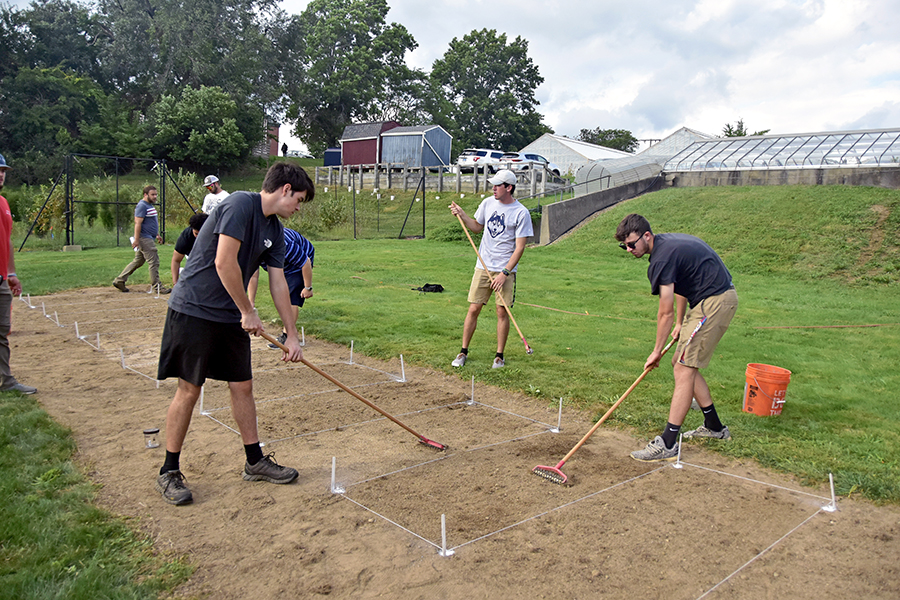
Agriculture, Health and Natural Resources
Major Requirements
The Agriculture, Health and Natural Resources major is an interdisciplinary major designed for students who want broad training in agricultural, environmental, and/or health sciences, with content that does not readily align with any one department or major. Students work with advisors to develop and complete a personalized and interdepartmental baccalaureate program based on their educational and career interests and goals. Courses selected for this major will include both introductory and advanced material from multiple departments in the College of Agriculture, Health and Natural Resources, as well as prerequisite and related knowledge and experiences in other disciplines. Students must have completed 24 credits to declare this major.
UConn Catalog: Agriculture, Health and Natural Resources Major Requirements
A student's official Plan of Study/Academic Requirements is located in StudentAdmin.
Sample Sequences of Courses
Sample Sequences are for advising purposes only.
Students do not have to follow these sequences exactly.

Allied Health Sciences
Major Requirements
The Allied Health Sciences major leads to a Bachelor of Science degree. Students may elect to pursue the major with our without a concentration. The major offers a general (Standard) plan and four concentrations in Health Sciences, Healthcare Administration, Public Health and Health Promotion, and Occupational and Environmental Health and Safety.
UConn Catalog: Allied Health Sciences Major Requirements
A student's official Plan of Study/Academic Requirements is located in StudentAdmin.
Sample Sequences of Courses
Sample Sequences are for advising purposes only.
Students do not have to follow these sequences exactly.
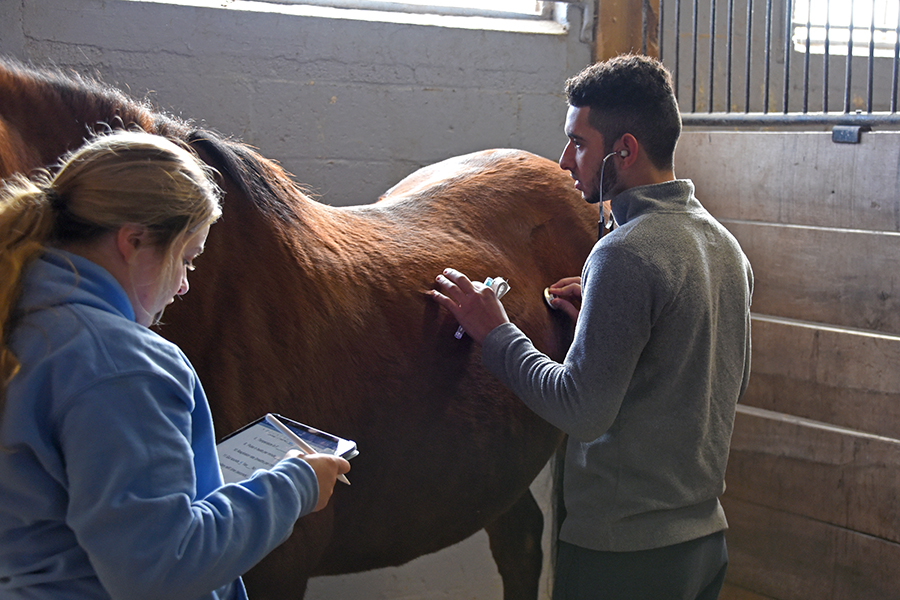
Animal Science
Major Requirements
This major provides six areas of interest leading to the B.S. degree: Pre-Professional (veterinary medicine or graduate training), Animal Biotechnology, Business/Service, Equine Science, Food Science, and Production Management. Please visit the Department of Animal Science for detailed information.
UConn Catalog: Animal Science Major Requirements
A student's official Plan of Study/Academic Requirements is located in StudentAdmin.
Sample Sequences of Courses
Sample Sequences are for advising purposes only.
Students do not have to follow these sequences exactly.

Diagnostic Genetic Sciences*
Major Requirements
The Diagnostic Genetic Sciences (DGS) major is an educational and clinical training program in genetic and genomic testing leading to a Bachelor of Science degree. Genetic and genomic testing information is used for screening, diagnosing, prognosticating and monitoring many human diseases. Diagnostic genetic scientists are credentialed professionals critical to the research, application and translation of genetics and genomics to personalized or precision medicine. Students in the DGS professional degree program complete requirements for diagnostic molecular sciences which is accredited by the:
National Accrediting Agency for Clinical Laboratory Sciences (NAACLS)
5600 N. River Rd, Suite 70
Rosemont IL 60018-5119
Phone: 773-714-8880
The DGS curriculum includes on-campus didactic and laboratory coursework and an off-site clinical and research internship at an affiliated laboratory. Graduates are eligible to sit for the American Society for Clinical Pathobiology (ASCP) Board of Certification examination in the molecular biology (MB) immediate upon graduation.
UConn Catalog: Diagnostic Genetic Sciences Major Requirements
A student's official Plan of Study/Academic Requirements is located in StudentAdmin.
Sample Sequences of Courses
Sample Sequences are for advising purposes only.
Students do not have to follow these sequences exactly.

Dietetics*
Major Requirements
UConn Catalog: Dietetics Major Requirements
For information about admission, supplemental academic standards, and clinical placement requirements, see Allied Health Sciences Professional Majors.
A student's official Plan of Study/Academic Requirements is located in StudentAdmin.
Sample Sequences of Courses
Sample Sequences are for advising purposes only.
Students do not have to follow these sequences exactly.

Economics of Sustainable Development and Management
Major Requirements
The B.S. degree in Economics of Sustainable Development and Management prepares students to use economic analysis and quantitative methods to understand and evaluate decision problems faced by individuals, firms, and public agencies. Students will learn how to apply economic analysis to the organization and operation of businesses and industries, the economic development process, and its application to specific regions and communities. The curriculum incorporates business management, marketing and finance, production, investment choices, international trade, consumer behavior, sustainable development, economics of the food system, economic analysis of policies and programs that target human wellbeing, including health and nutrition, and the economics of policy.
UConn Catalog: Economics of Sustainable Development and Management
A student's official Plan of Study/Academic Requirements is located in StudentAdmin.
Sample Sequences of Courses
Sample Sequences are for advising purposes only.
Students do not have to follow these sequences exactly.

Environmental and Natural Resource Economics
Major Requirements
The B.S. degree in Environmental and Natural Resource Economics prepares students to use economic analysis and quantitative methods to understand and evaluate complex interactions between economic markets, societal values, human needs and wants, and government policies. After graduation, students will be able to apply their acquired analytical and quantitative skills in a variety of jobs and for graduate school preparation. Environmental and Natural Resource Economics work for firms and consulting companies in the private sector, and for public agencies. The curriculum incorporates economics into the study of pollution (air, water and land), waste disposal and recycling, business and consumer behavior, sustainable development, climate change and adaptation, pollution control, energy, renewable resources, environmental justice, poverty, economic valuation of environmental protection, benefit cost analysis, and policy evaluation. Students are encouraged to enroll in independent study to work individually with a faculty member on a chosen topic related to environmental and natural resource economics. Students can also receive academic credit through internships and participation in study abroad programs.
UConn Catalog: Environmental and Natural Resource Economics
A student's official Plan of Study/Academic Requirements is located in StudentAdmin.
Sample Sequences of Courses
Sample Sequences are for advising purposes only.
Students do not have to follow these sequences exactly.
View all Concentration Sample Sequences:
First Year - Fall
|
First Year - Spring
|
Second Year - Fall
|
Second Year - Spring
|
Third Year - Fall
|
Third Year - Spring
|
Fourth Year - Fall
|
Fourth Year - Spring
|

Environmental Sciences
Major Requirements
The major in Environmental Sciences is based in the physical and biological sciences, but also includes course work in selected areas of the social sciences. The major leads to a Bachelor of Science degree, and may be adopted by students in either the College of Agriculture, Health and Natural Resources or the College of Liberal Arts and Sciences. This curriculum offers a comprehensive approach to the study of environmental problems, including not only a rigorous scientific background, but also detailed analyses of the social and economic implications of environmental issues. The complexity and interdisciplinary nature of environmental science is reflected in the core requirements of the major. These courses, assembled from several different academic departments representing two colleges, provide both breadth and depth, preparing students for careers that deal with environmental issues and for graduate study in environmental sciences and related fields.
UConn Catalog: Environmental Science Major Requirements
A student's official Plan of Study/Academic Requirements is located in StudentAdmin.
Sample Sequences of Courses
Sample Sequences are for advising purposes only.
Students do not have to follow these sequences exactly.
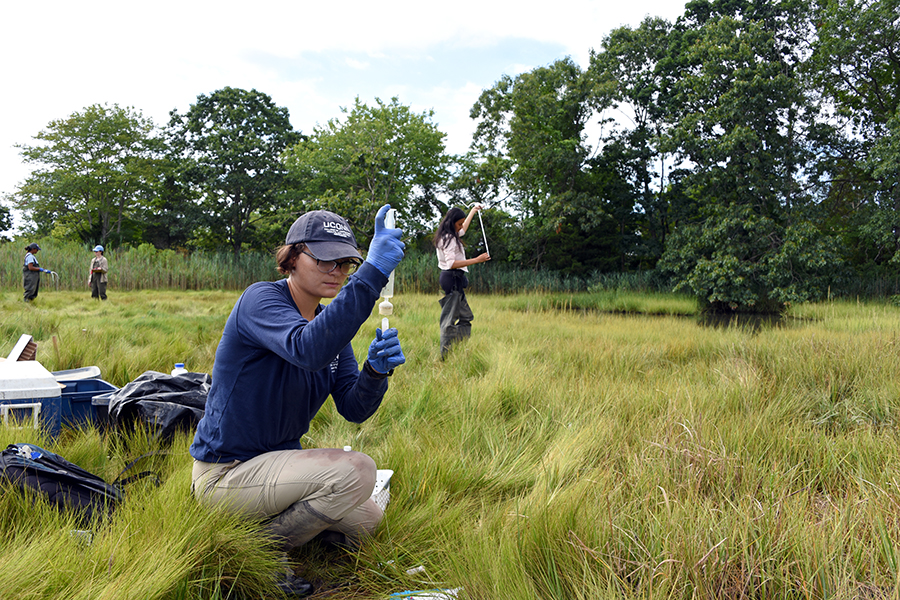
Environmental Studies
Major Requirements
The Environmental Studies major is an interdisciplinary program designed to provide students with the knowledge, skills, and perspectives needed to understand the interactions between human society and the environment. Understanding the ethical and cultural dimensions of our relationship with the environment, as well as the challenges of protecting it, requires insights from multiple perspectives, including the humanities, the social sciences, and the natural sciences. Core courses in the major ensure familiarity with basic principles from these three areas. With this shared core of knowledge, majors will focus their studies on an area of special interest, taking electives and related courses that allow greater specialization. Among the many possibilities are environmental sustainability, issues concerning public policy and environmental justice, and the literary and philosophical legacy of human encounters with the non-human world. A capstone course will allow each student to research a distinct perspective on a contemporary environmental issue. A major in Environmental Studies might lead to a career in a variety of fields, including public policy, environmental education, eco-tourism, marketing
or consulting, journalism, or advocacy.
The major leads to a Bachelor of Arts degree in the College of Liberal Arts and Sciences (CLAS) or the College of Agriculture, Health and Natural Resources (CAHNR). The student’s choice of colleges should be made in consultation with faculty and advisors based upon the student’s interests and career goals.
UConn Catalog: Environmental Studies Major Requirements
A student's official Plan of Study/Academic Requirements is located in StudentAdmin.
Sample Sequences of Courses
Sample Sequences are for advising purposes only.
Students do not have to follow these sequences exactly.
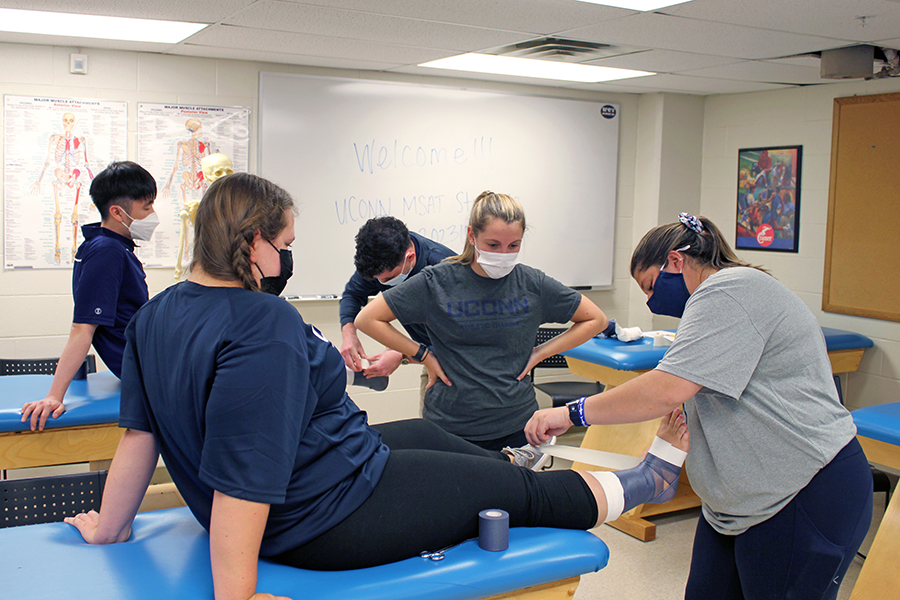
Exercise Science
Major Requirements
The Exercise Science major is an undergraduate degree program integrating the fields of exercise physiology, biomechanics, sport performance, and sport psychology, and leads to a Bachelor of Science degree upon completion. All students in the Exercise Science major complete a core set of requirements followed by a specific plan associated with one of the following concentrations: Exercise Science; Sports Health; Sports Performance; or Pre-Medical Science. Students will work with program advisors to determine the best concentration for career planning purposes.
All concentrations have immediate employment opportunities in a variety of settings upon graduation. In addition, the Exercise Science concentration will prepare students for graduate studies in a variety
of sports medicine or rehabilitation professions, such as physical therapy, athletic training, and occupational therapy, by incorporating most prerequisites for these programs into the standard curriculum. Alternatively, the Sports Health concentration also prepares students for graduate programs in Athletic Training. The Pre- Medical Science concentration is designed to prepare students for applying to Physician Assistant graduate programs or medical schools. The Sports Performance concentration prepares students for immediate entry into the sports/fitness/health industries, or for graduate studies in Exercise Science/Physiology.
UConn Catalog: Exercise Science Major Requirements
A student's official Plan of Study/Academic Requirements is located in StudentAdmin.
Sample Sequences of Courses
Sample Sequences are for advising purposes only.
Students do not have to follow these sequences exactly.
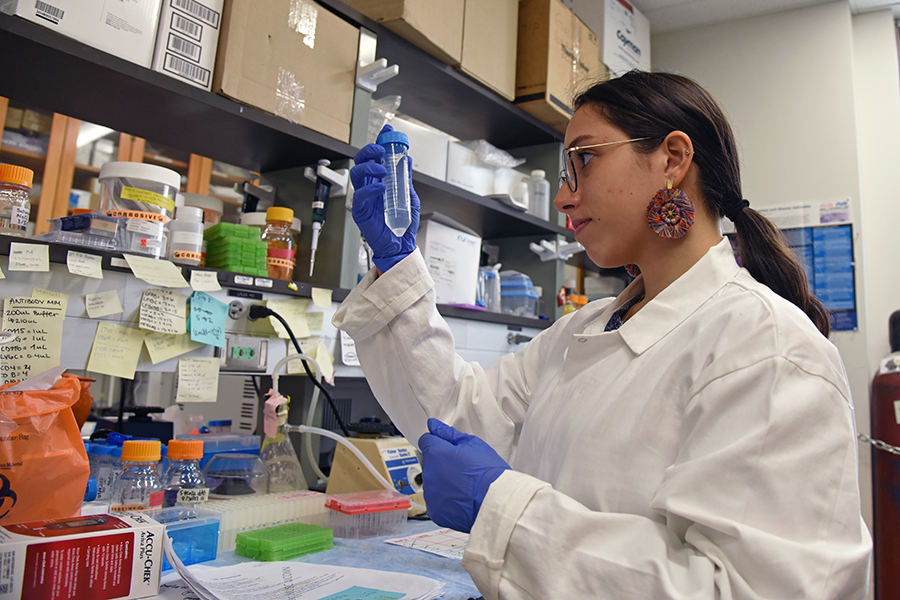
Individualized Major*
Major Requirements
The Individualized Major program allows students to create a major that is not otherwise offered at the University of Connecticut. Students pursuing an Individualized Major must meet all university-level and college-level requirements for graduation and complete at least 36 credits numbered 2000 or above. Requirements for declaring and completing an Individualized Major are listed below:
- Students must be in good academic standing with a minimum GPA of 2.5 to declare an Individualized Major.
- Students must submit a proposed statement of purpose and identify three faculty members who are willing to serve as an advisory committee.
- An Individualized Major has a minimum of 36 credits numbered 2000 or above courses which must: be from two or more departments; include at least 18 credits from departments in the College of Agriculture, Health and Natural Resources; be approved by the student’s advisory committee; be taken at the University of Connecticut; have a combined Grade Point Average of at least 2.5; include no more than 6 credits of Independent Study and Internship; not to be taken on Pass/Fail; meet all requirements of the “36 Credit Group” of the College of Agriculture, Health and Natural Resources
The writing in the major and information literacy requirements will be satisfied by meeting these requirements for any of the majors within the College of Agriculture, Health and Natural Resources.
A student's official Plan of Study/Academic Requirements is located in StudentAdmin.

Landscape Architecture
Major Requirements
This major provides instruction in site planning and design, landscape history, landscape architectural graphics and presentation. It includes the use of plants and other features to enrich exterior spaces. Through seminars, studio projects and internships, students learn to apply theory to actual case studies. Landscape Architectural Accreditation Board (LAAB). For detailed information, please refer to (http://psla.uconn.edu).
UConn Catalog: Landscape Architecture Major Requirements
A student's official Plan of Study/Academic Requirements is located in StudentAdmin.
Sample Sequences of Courses
Sample Sequences are for advising purposes only.
Students do not have to follow these sequences exactly.
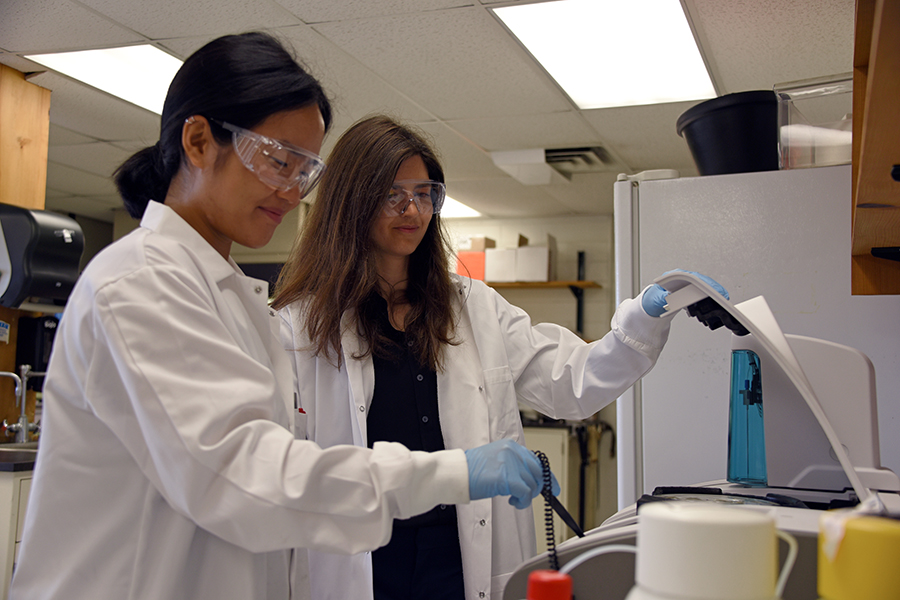
Medical Laboratory Sciences*
Major Requirements
Medical Laboratory Scientists apply biological and chemical principles to perform, interpret, and correlate laboratory analyses on body fluids and tissues. Medical Laboratory Scientists are responsible for selecting appropriate methods and implementing quality assurance for tests designed to promote health, and prevent, diagnose and treat diseases. The Medical Laboratory Sciences major leads to a Bachelor of Science degree. The MLS Program is accredited by the:
National Accrediting Agency for Clinical Laboratory Sciences (NAACLS)
5600 North River Road, Suite 720
Rosemount, IL 60018-5119
Phone: (773) 714-8880
Graduates are eligible for the National Board of Certification examination administered by the American Society for Clinical Pathology (ASCP) immediately upon graduation.
UConn Catalog: Medical Laboratory Sciences Major Requirements
The Department of Allied Health Sciences also offers a Medical Laboratory Sciences Certificate. See the University of Connecticut Graduate Catalog for more information.
A student's official Plan of Study/Academic Requirements is located in StudentAdmin.
Sample Sequences of Courses
Sample Sequences are for advising purposes only.
Students do not have to follow these sequences exactly.

Natural Resources
Major Requirements
This major, offered by the Department of Natural Resources and the Environment, prepares students for careers related to the management of natural resources. Students develop skills in applying modern technology, concepts and principles dealing with sustainable development, environmental protection and resource conservation.
UConn Catalog: Natural Resources Major Requirements
A student's official Plan of Study/Academic Requirements is located in StudentAdmin.
Sample Sequences of Courses
Sample Sequences are for advising purposes only.
Students do not have to follow these sequences exactly.

Nutritional Sciences
Major Requirements
Students majoring in Nutritional Sciences pursue one of three tracks: Nutritional Sciences, Didactic Program in Dietetics or Pre-Medical Profession. Each area follows a different curriculum including non-departmental courses, in order to best prepare students for their future goals. Students preparing to become registered dietitians follow the Didactic Program in Dietetics which is accredited by the:
Accreditation Council for Education in Nutrition and Dietetics (ACEND)
120 South Riverside Plaza., Suite 2190
Chicago, IL 60606-6995
(800) 872-5327
The Nutritional Sciences curriculum is generally more flexible than the Dietetic curriculum. Students in this option integrate the Nutritional Sciences core requirements with additional courses in the laboratory or behavioral sciences. A minor in Nutrition for Exercise and Sport and a minor in Food Science are described in the Minors section. For detailed information, please refer to the Department of Nutritional Sciences website.
UConn Catalog: Nutritional Sciences Major Requirements
The department also offers accelerated 4 + 1 programs, allowing students in all three undergraduate tracks to complete a Bachelor of Science and Master of Science degree in five years. Please see The Graduate Catalog for requirements for the M.S. degree.
A student's official Plan of Study/Academic Requirements is located in StudentAdmin.
Sample Sequences of Courses
Sample Sequences are for advising purposes only.
Students do not have to follow these sequences exactly.
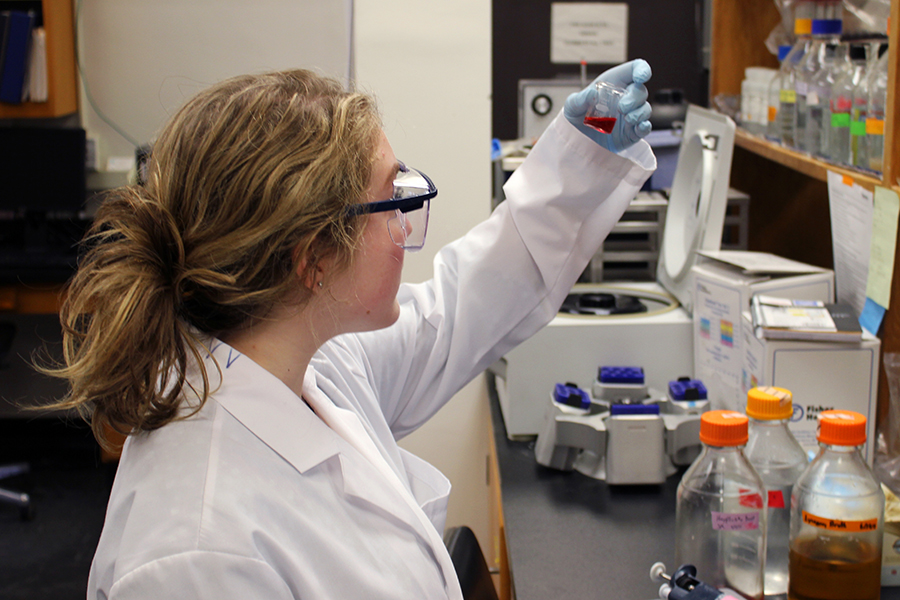
Pathobiology
Major Requirements
Effective for the 2022-23 catalog, the PVS subject code was changed to PATH.
The Pathobiology (PATH) curriculum is designed for students preparing to enter medical, dental, physician assistant, veterinary, and graduate schools, or to pursue careers in medical biotechnology, biomedical sciences, global health, one health, and public health. The Pathobiology major offers a standard plan that leads to a Bachelor of Science degree and three optional areas of concentration:
1. Pre-Professional Biomedical Sciences (PPBS)
2. Medical Biotechnology (MB)
3. Global Health (GH)
Students are automatically admitted into the standard plan and may choose to declare into one of the concentration areas at any time.
Non-pathobiology majors in good academic standing with a cumulative GPA of at least 2.0 that wish to declare or change their major to Pathobiology can do so at any time during the calendar year. For detailed information, please refer to https://pathobiology.cahnr.uconn.edu/undergraduate
UConn Catalog: Pathobiology Major Requirements
A student's official Plan of Study/Academic Requirements is located in StudentAdmin.
Sample Sequences of Courses
Sample Sequences are for advising purposes only.
Students do not have to follow these sequences exactly.

Plant Science
Major Requirements
The Plant Science major, with concentrations in Environmental Horticulture, Sustainable Agriculture, and Turfgrass Science, focuses on the science and practices associated with sustainable plant production and/or use within managed systems. Courses emphasize practices and concepts related to reducing environmental impact during production and in managed land use
systems.
Concentrations focus on the production of ornamental and edible crops in controlled environments, greenhouses, nurseries and on farms; management practices for built landscapes and surfaces used for recreational and sporting activities; and the selection and management of ornamental trees, shrubs, grasses, native species, and plants and soils that perform ecosystem services in recreational, urban, and suburban settings to meet functional and aesthetic requirements. The program emphasizes hands-on learning and developing and applying knowledge to solve contemporary problems in individual and team approaches. Students have the opportunity to gain real-world experience through internships.
UConn Catalog: Plant Science Major Requirements
A student's official Plan of Study/Academic Requirements is located in StudentAdmin.
Sample Sequences of Courses
Sample Sequences are for advising purposes only.
Students do not have to follow these sequences exactly.
CAHNR Minors
Current UConn Students: Please use the Add a CAHNR Minor form to apply for a CAHNR minor.
Agricultural and Health Biotechnology
This interdepartmental minor provides students with an in-depth, multidisciplinary education in the field of biotechnology. The minor will prepare students for advanced studies and career development in applied molecular biology, as well as agricultural and health biotechnology.
UConn Catalog: Agricultural Biotechnology Minor Requirements
Agriculture Learning & Outreach
This minor provides the breadth of foundational knowledge needed in professions that involve educating others about a range of agricultural content and issues. The minor in Agricultural Learning and Outreach is only open to students in the College of Agriculture, Health and Natural Resources.
UConn Catalog: Agriculture Learning and Outreach Minor Requirements
Agriculture Learning and Outreach Minor Plan of Study
Minor Advisors
Animal Science
This minor provides students with an opportunity to pursue an interest in animal science.
UConn Catalog: Animal Science Minor Requirements
Minor Advisors
Business Management and Marketing
The minor will provide an overview of marketing, management, and financial principles and concepts in applied business and economics. Analytical and applied decision-making skills are emphasized.
UConn Catalog: Business Management and Marketing Minor Requirements
Business Management and Marketing Minor Plan of Study
Minor Advisors
Cannabis Cultivation
The minor in Cannabis Cultivation provides training pertaining to the propagation, cultivation, commercial production, maintenance, processing, and potential markets for and uses of Cannabis Sativa.
UConn Catalog: Cannabis Cultivation Minor
PDF Cannabis Cultivation Plan of Study
Minor Advisors
Dairy Management
This minor provides interested students with an in-depth exposure to all aspects of dairy farm management. Students will have the opportunity to manage a portion of the UConn dairy herd and be responsible for daily activities and short and long-term decision-making.
UConn Catalog: Dairy Management Minor Requirements
Dairy Management Minor Plan of Study
Minor Advisors
Development Economics and Policy
The minor will provide an overview of the core issues in international and U.S. economic development. Special focus is given to practical analysis and real-world problems. This minor is not open to Applied and Resource Economics majors who are concentrating in Development Economics and Policy.
UConn Catalog: Development Economics and Policy Minor Requirements
Development Economics and Policy Minor Plan of Study
Minor Advisors
Environmental Economics and Policy
The minor will provide an overview of key concepts and methods used by economists to analyze problems associated with human use and misuse of natural resources and the environment and to evaluate policy options for better management of these resources for current and future generations.
UConn Catalog: Environmental Economics and Policy Minor Requirements
Environmental Economics and Policy Minor Plan of Study
Minor Advisors
Environmental Health Specialist/Sanitarian
This minor is for students, particularly those in the various life science, physical science, environmental science, and health science majors, who may wish to pursue employment as an environmental health specialist/sanitarian. Environmental health specialists work in public health departments/districts on a variety of outdoors and indoor environmental health and food inspections (both pre and post facility/system installation), conduct health investigations, ensure compliance, and promote environmental health awareness and emergency preparedness.
UConn Catalog: Environmental Health Specialist/Sanitarian Minor Requirements
Environmental Health Specialist/Sanitarian Plan of Study
Minor Advisors
Environmental Studies
Environmental Studies focuses on the interaction between humans and the environment. The Environmental Studies Minor is an interdisciplinary (humanities, social sciences, and biophysical sciences) program for students interested in environmental problems on a local, national, and global level. This minor provides students the opportunity to focus their related area and/or electives on environmental issues. None of the courses in the minor can be used within the student’s major.
UConn Catalog: Environmental Studies Minor Requirements
Environmental Studies Minor Plan of Study
Minor Advisors
Equine Business Management
The minor provides interested students with an overview of marketing, management, and financial principles and concepts in equine management. Analytical and applied decision-making skills are emphasized.
UConn Catalog: Equine Business Management Minor Requirements
Equine Business Management Minor Plan of Study
Minor Advisors
Equine Sports Rehabilitation
The Equine Sports Rehabilitation minor provides students an opportunity to gain theoretical and practical skills in rehabilitation of equine athletes.
The minor is offered by the Department of Animal Sciences.
Plan of Study for Minor in Equine Sports Rehabilitation
Minor Advisor
Food Science
This minor addresses food science as an academic discipline which utilizes approaches for solving applied science problems associated with the acquisition and processing of food.
UConn Catalog: Food Science Minor Requirements
Food Science Minor Plan of Study
Minor Advisors
Global Environmental Change
The Global Environmental Change minor provides a comprehensive understanding of earth’s interconnected environmental systems and the consequences of those changes to human well-being. Topics include climate change, land and ocean use, governance and policy, and related subjects in natural sciences. A maximum of three credits towards the minor may be transfer credits of courses equivalent to University of Connecticut courses. A maximum of six credits in the minor may be part of the major. Students cannot receive the minor within the same Environmental Sciences degree concentration.
UConn Catalog: Global Environmental Change Minor Requirements
Global Environmental Change Minor Plan of Study
Minor Advisors
Integrated Pest Management
This minor introduces fundamentals of plant health and integrated pest management in agronomy, horticulture and turfgrass systems. Not open to students in the Plant Science major.
UConn Catalog: Integrated Pest Management Minor Requirements
Integrated Pest Management Minor Plan of Study
Minor Advisors
Nutrition for Exercise and Sport
This minor is offered by the Department of Nutritional Sciences in cooperation with the Departments of Allied Health Sciences and Kinesiology.
UConn Catalog: Nutrition for Exercise and Sport Minor Requirements
Nutrition for Exercise and Sport Minor Plan of Study
Minor Advisors
Ornamental Horticulture
The minor in Ornamental Horticulture provides an introduction to the production, maintenance and use of plants to enhance human environments. Not open to students declaring the Environmental Horticulture concentration in the Plant Science major.
UConn Catalog: Ornamental Horticulture Minor Requirements
Ornamental Horticulture Minor Plan of Study
Minor Advisors
Sustainable Community Food Systems
The Sustainable Community Food Systems (SCFS) minor provides an in-depth exploration of food systems through performing an intensive summer work experience and fall internship (six credits) and reflecting on the practice of working in a sustainable community food system. Farm experience through working at an approved farm or community garden is an essential component of this program, along with personal reflection and relevant academic coursework.
UConn Catalog: Sustainable Community Food Systems Minor Requirements
Sustainable Community Food Systems Minor Plan of Study
Minor Advisors
Sustainable Environmental Systems
The Sustainable Environmental Systems minor applies the principles of sustainability science, systems thinking, and the environmental sciences to help society move towards a more sustainable future. Topics include ecological systems, natural resources management, environmental ethics and cultural interactions, as well as selected economics and business perspectives. A maximum of three credits towards the minor may be transfer credits of courses equivalent to University of Connecticut courses. A maximum of six credits in the minor may be part of the major. Students cannot receive the minor within the same Environmental Sciences degree concentration.
UConn Catalog: Sustainable Environmental Systems Minor Requirements
Sustainable Environmental Systems Minor Plan of Study
Minor Advisors
Sustainable Food Crop Production
This minor provides the breadth of foundational knowledge needed in professions that involve educating others about a range of agricultural content and issues.
UConn Catalog: Sustainable Food Crop Production Minor Requirements
- Three credits of coursework from: EDCI 1100, 2100; EPSY 1100, 2810, 3010.
- Three credits of 2000-level and higher coursework, with approval from the minor advisor, from each of the following departments: Animal Science, Natural Resources and the Environment, and Plant Science and Landscape Architecture.
- Three or more credits of coursework from: AGNR 4500; EGEN 3200; EPSY 3020. Other leadership or related experiential courses such as internships may be used to fulfill this requirement with permission of the advisor.
Sustainable Food Crop Production Minor Plan of Study
Minor Advisors
Therapeutic Horsemanship Education
This minor provides students with an opportunity to pursue an interest in therapeutic riding programs, and provides a basis for further study and certification as a therapeutic riding instructor or director.
UConn Catalog: Therapeutic Horsemanship Education Minor Requirements
Riding experience at Intermediate Level II is required to enroll in ANSC 4457, one of the required courses of this minor.
Therapeutic Horsemanship Education Minor Plan of Study
Minor Advisors
Turfgrass Management
The minor in Turfgrass Management provides an introduction to the management and maintenance of turfgrasses used for aesthetics (residential and commercial lawns, parks, institutional grounds), recreation (golf courses, athletic and sports fields), and functional purposes (sod farms, highway medians, inland and coastal erosion control sites, conservation). This minor will also assist those interested in sales, marketing, or any other business aspects of industries associated with turfgrass and ornamental horticulture. Not open to students declaring the Turfgrass Science concentration in the Plant Science major.
Wildlife Conservation
This minor provides students with a basic understanding of wildlife resources management. Students will be required to complete at least 18 credits that include a common core for all students and a selection of courses based on a specific area of interest. Any student but Natural Resources majors can graduate with this minor.
UConn Catalog: Wildlife Conservation Minor Requirements
Wildlife Conservation Minor Plan of Study
Minor Advisors
Graduate Programs
Graduate programs in the College of Agriculture, Health and Natural Resources are housed our departments, and administered by the UConn Graduate School. Students can choose from a range of disciplinary and interdisciplinary programs at the certificate, master's, and Ph.D. levels. Learn more about our graduate programs at the Graduate School's website.